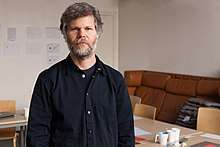Casey Reas
| Casey Reas | |
|---|---|
 | |
| Born |
Casey Edwin Barker Reas 1972 (age 45–46) Troy, Ohio, United States |
| Nationality | American |
| Alma mater | University of Cincinnati, Massachusetts Institute of Technology |
| Known for | Processing programming language |
| Website |
reas |
Casey Edwin Barker Reas (born 1972), also known as C. E. B. Reas or Casey Reas,[1] is an American artist whose conceptual, procedural and minimal artworks explore ideas through the contemporary lens of software.
Reas is best known for having created, with Ben Fry, the Processing programming language.
Reas's software generated images derive from short text instructions explaining processes that define a network of actions. The instructions are expressed in different media including natural language, machine code, and computer simulations, resulting in both dynamic and static images. Each translation reveals a different perspective on the process and combines with the others to produce continually evolving visual traces. Since 2012, Reas has incorporated broadcast images into his work, algorithmically distorting them to create abstractions that retain traces of their original, representational function.
He has shown his work at the Whitney Museum of American Art's artport,[2] Ars Electronica in Austria, ZKM in Germany, Transmediale in Berlin, GAFFTA in San Francisco, Uijeongbu International Digital Art Festival in Korea, the Danish Film Institute, bitforms gallery in New York and Seoul, IAMAS and ICC in Japan, the Microwave International Media Art Festival in Hong Kong, and the Sonar Festival in Barcelona.
Education
Reas studied design at the University of Cincinnati[3] and then spent the next two years developing software and electronics as an artistic exploration. While studying design in Cincinnati, Casey Reas was a member of a band called 'nancy' with Scott Devendorf and Matt Berninger, who went on to become members of The National.[4] Reas went on to direct four music videos for the band in support of their 2017 album, Sleep Well Beast.[5][6]
In 2001, Reas earned a Master of Science in Media Arts and Sciences as a part of the Aesthetics and Computation Group at the Massachusetts Institute of Technology's MIT Media Lab.[3]
Career
After graduating, Reas began to exhibit his software and installations internationally in galleries and festivals.
In 2003, Reas moved to Los Angeles where he is currently a Professor in the Department of Design Media Arts at the University of California, Los Angeles.[7]
Reas is also notable for having created the Processing programming language. Together with Ben Fry, he created the software while at MIT, and it is now used by thousands of artists and designers worldwide.[8]
Public collections
His work is held by the Victoria and Albert Museum, the Mary and Leigh Block Museum of Art and other institutions.
Books
- Casey Reas and Benjamin Fry, Processing: A Programming Handbook for Visual Designers and Artists, MIT Press, 2007.
- Casey Reas, Process compendium 2004-2010, REAS Studio, 2010. ISBN 978-1-4507-2713-6
References
- ↑ "Information". reas.com. Casey Reas. Retrieved 28 November 2015.
- ↑ http://artport.whitney.org/commissions/softwarestructures/ Software Structures
- 1 2 "Casey Reas Biography" (PDF). Bitforms Gallery. Bitforms Gallery. Retrieved 20 August 2015.
- ↑ http://acg.media.mit.edu/people/creas/eat/ruther3429.html
- ↑ "Casey Reas | IMVDb". IMVDb. Retrieved 2017-11-07.
- ↑ "The National". YouTube. Retrieved 2017-11-07.
- ↑ "Casey Reas Professor". UCLA Design Media Arts. UCLA. Retrieved 20 August 2015.
- ↑ Reas, Casey; Fry, Ben (2007). Processing: a programming handbook for visual designers and artists. MIT Press.
Further reading
- Bruce Wands, Art of the Digital Age, Thames & Hudson, 2006. ISBN 0-500-23817-0.
- Mark Tribe and Reena Jana, New Media Art, Taschen, 2006. ISBN 3-8228-3041-0.
- Joline Blais and Jon Ippolito, At the Edge of Art, Thames & Hudson, 2006. ISBN 0-500-23822-7.